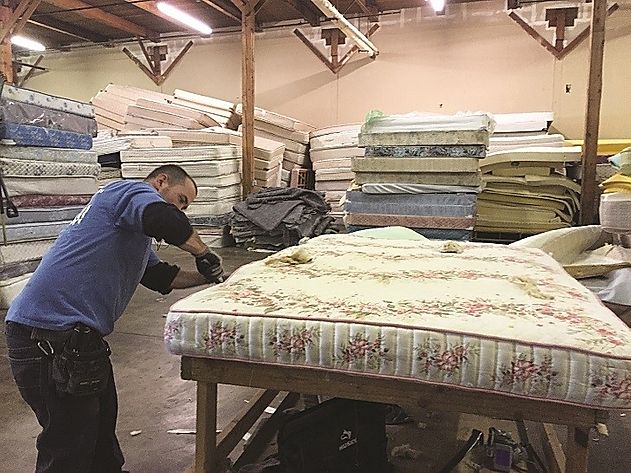For several years, Christopher Conway has volunteered at the Denver Rescue Mission, serving up meals to the homeless. Many are men who were formerly incarcerated and fighting their way back from drug or alcohol addiction. Conway says he often witnesses the struggles individuals endure while trying to step out of the shadow of their criminal conviction and secure gainful employment. Their time in prison is a black mark that makes the job hunt nearly impossible.
“Even when they’re in recovery and committed to staying sober – to remaking themselves – others are reluctant to offer these individuals redemptive opportunities,” said Conway.
“They’ve been marginalized because of their criminal records and inability to formulate a career path.”
In early 2012, Conway heard about a team of college students at Belmont University who created a pilot program called Spring Back Recycling, which gives those with a criminal conviction a fresh start by offering them employment in mattress recycling. Conway believed the students were on to something. Using mattress recycling as a vehicle for redemptive employment opportunities could prove to be a sound business model.
“When I learned about Spring Back, how they developed a sustainable, environmentally conscious business that provides a social benefit, I knew I discovered my purpose,” explained Conway. “I found a way to help break the cycle of being put in prison, getting out, being unemployable.”
In August 2012, he opened a Spring Back facility in Colorado. “Spring Back Colorado protects the environment and provides a service to the public by keeping post-consumer bedding out of landfills. At the same time, we create tax-paying citizens that become an asset to their community,” Conway said.
And while Colorado’s current minimum wage is $8.23, Spring Back Colorado pays its lowest-paid employees $13.00/ hour.
The impact of grant funding
During its first month of operation, Spring Back Colorado processed 50 mattresses and box springs. Less than one year later, that number grew to 650 per month. To keep up with growing demand, the business needed to improve the efficiency of its operations.
“We were getting along okay, but we didn’t have the operational efficiency that was sorely needed. We didn’t have the properly functioning equipment to efficiently process the mattresses and bring our business to the next level,” Conway explained.
In July 2013, in order to address their early challenges with operational efficiency, Spring Back Colorado secured a $77,200 Recycling Resources Economic Opportunity (RREO) grant. Conway says the grant provided the infusion of funds needed to purchase equipment for strengthening the operation, such as appropriate balers, an upgraded forklift, a truck to pick up mattresses, ventilation fans, scales and pallets.
According to Conway, the new equipment had a huge impact on processing output. During the twelve-month grant cycle, Spring Back Colorado went from processing 650 mattresses per month to 1,500 per month – more than doubling its processing volume.
“The RREO grant was a real catalyst for our growth and for operating at peak efficiency. It’s given us the proper machinery to really build a high-volume, sustainable business aimed at reducing the waste stream,” Conway said.
In fact, Spring Back Colorado’s recycling volume increased so dramatically, it outgrew its original warehouse space. Shortly after the grant period, the business moved to a warehouse that almost doubled its storage and processing areas.
During the grant year, Spring Back Colorado says they experienced a 130 percent increase in the number of mattresses processed on a monthly basis and diverted more than 693 tons of mattress waste away from local landfills. The company also found secondary markets for 87 percent of collected mattress and box-spring material. Just as significantly, the grant spurred enough growth to create three full-time jobs, allowing Conway to offer employment to a total of seven disenfranchised individuals.
From mattress waste diverted during the grant year ending in 2014, Spring Back Colorado recovered 316 tons of steel, 109 tons of foam 124 tons of ticking, 64 of shoddy cloth, 54 tons of cotton and 25 tons of plastics for a total of over 690 tons. Currently the company recycles 3,000 mattresses per month.
The RREO grant program funds projects that promote economic development through the productive management of recyclable materials that would otherwise be treated as discards. Funds are awarded to businesses, local governments, nonprofit groups, and schools and universities throughout Colorado. The program is managed by the Colorado Department of Health and Environment.
Steps for diverting mattresses from landfills
1. Collect and store
Spring Back Colorado receives discarded mattresses and box springs from various sources, including mattress retailers, universities, government institutions, city-sponsored mattress drives and homeowners. It collects a small recycling fee on each discarded mattress.
2. Disassemble and sort
Once at its processing facility, employees tear apart and sort the mattress and box- springs components: steel inner-springs and box-springs, foam, shoddy cloth, ticking, cotton, plastic and wood.
3. Recycle and re-purpose
Spring Back Colorado bundles and transports the sorted bedding materials to buyers, who then re-purpose or recycle the components for such things as carpet pads, wall insulation, steel, mulch or even dog beds.

